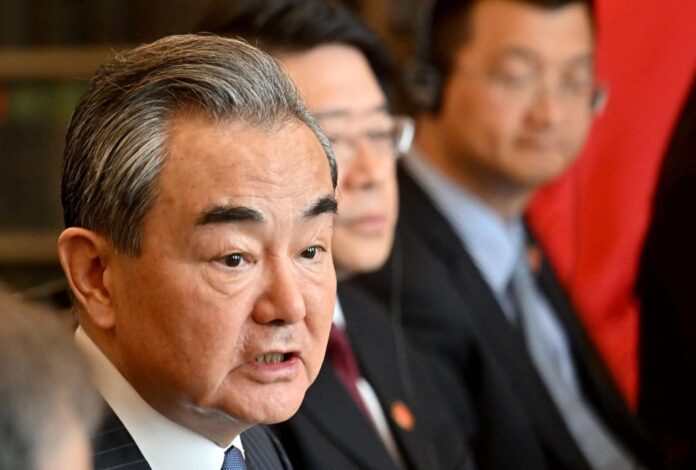China has begun a diplomatic “charm offensive”, a seeming shift from the aggressive “wolf warrior” tone of recent years. Last month, Vice Premier Liu He travelled to Davos for the World Economic Forum to declare to world economic leaders that “foreign investments are welcome in China, and the door to China will only open up further”.
Now Wang Yi, member of the Chinese Communist Party’s Politburo Standing Committee and Director of China’s Foreign Affairs Commission is in the midst of a concerted diplomatic foray through Europe. With an itinerary including attendance at the Munich Security Conference and visits to Paris, Rome, Budapest and Moscow, Wang’s objective is to reinvigorate both economic ties and diplomatic relations with Europe as China’s relations with the United States continue to deteriorate and the country seeks to break out of its Covid-zero-induced economic slowdown.
Wang’s chances appear fruitless due to both the atmospherics surrounding his tour and Beijing’s inability (or unwillingness) to see how Russia’s invasion of Ukraine has reshaped European security perceptions.
The ongoing fall-out from the Chinese surveillance balloon controversy and the anniversary of the Russian invasion of Ukraine, in particular, have placed many European capitals in a bind vis-à-vis their relations with Beijing. China’s ongoing refusal to condemn Russia’s invasion and claims (as yet unsubstantiated) by US Secretary of State Antony Blinken that China may soon provide “lethal aid” to Russia in the form of arms and ammunition has made for awkward balancing acts by a number of European capitals, such as Paris and Berlin, that have been keen to reengage economically and diplomatically with Beijing.
There is no doubt that European scepticism about China’s position on the war in Ukraine remains a thorny issue. This was evident, for instance, in Wang’s meetings in Paris with both French President Emmanuel Macron and French Foreign Minister Catherine Colonna. During the former, there was “an in-depth exchange of views on the Ukraine issue”, while in the latter, Foreign Minister Colonna explicitly “called on” China “to step up pressure on Russia to enable a return to compliance with the basic principles of the Charter of the United Nations”.
Wang has subsequently demonstrated that Beijing’s strategy to overcome this obvious division in European and Chinese views on the war in Ukraine is to reiterate its existing position of “principled neutrality” coupled with an overt effort to flatter European sensibilities regarding their relative weight in the world. In this latter respect, Wang’s meetings with Macron in Paris and also German Chancellor Olaf Scholz in Munich were instructive. Here, Beijing’s chief diplomat underscored that China sees both Paris and Berlin as “independent” and “responsible” world powers that “shoulder the shared responsibilities for maintaining world peace and addressing global challenges”.
That European capitals would now distance themselves from Washington appears a vanishingly small possibility.
During his address to the Munich Security Conference over the weekend, Wang stuck to this approach. On the war in Ukraine, he reiterated Beijing’s position that it “adopts a responsible attitude towards international disputes and plays a constructive role in accordance with the merits of the matter itself”. As such, “China’s policy on the Ukraine issue boils down to one sentence: persuasion and talks”, which would form the basis of a soon-to-be-released Chinese position paper “on the political settlement of the Ukrainian crisis”.
Prompted for more details on this during Q&A, Wang provided little that was new. Rather, the MSC audience was treated to the familiar talking points that resolution of the war must be based on respect of the “sovereignty and territorial integrity of all countries”, the “principles of the UN Charter” and consideration of “the legitimate security concerns of all countries” party to the conflict.
However, this did provide an opening for Wang to take both a swipe at Washington and attempt to encourage Europeans to seek and grasp “strategic autonomy” (i.e. lessen their reliance on the United States). “Some people”, Wang suggested, “do not want peace talks to succeed or fighting to stop” as they “don’t care about the life and death of Ukrainians or the harm done to Europe, but have larger strategic calculations in mind”. In this situation, Wang continued, “We hope European friends will give sober thought to these questions: what kind of efforts are needed to stop the war? What kind of architecture is needed for peace and stability to endure in Europe? What kind of role does Europe need to play to realise its strategic autonomy?”.
Wang’s approach however is constrained by two major factors: an over-estimation of European capitals’ desire to remain at arm’s length from deepening Sino-US rivalry and an under-estimation of the impact of the Russian invasion of Ukraine on European security postures and perceptions. While European capitals are, as one analyst put it, “uncomfortable with some of the more hawkish rhetoric toward China that is coming out of Washington these days, notably in relation to Taiwan”, Beijing “should know better than to try to woo Europe by bashing the United States” at a time when European security concerns are firmly focused on Russia’s war against Ukraine.
That European capitals would now distance themselves from Washington appears a vanishingly small possibility, especially as Beijing is currently offering little in return on the most pressing security issue for Europe: the war in Ukraine. In fact, for some European capitals, Beijing is an increasingly problematic actor on here given evidence that Chinese companies and entities have been a major source of dual-use technology and components for Russia in the face of US and EU sanctions.
Beijing’s continuing effort to maintain the pose of “principled neutrality” on the war in Ukraine is thus of diminishing utility in its relations with Europe and should Blinken’s assertion that China may provide Russia with “lethal aid” come to pass, China’s relations with Europe may enter the same territory as Sino-US relations.









































